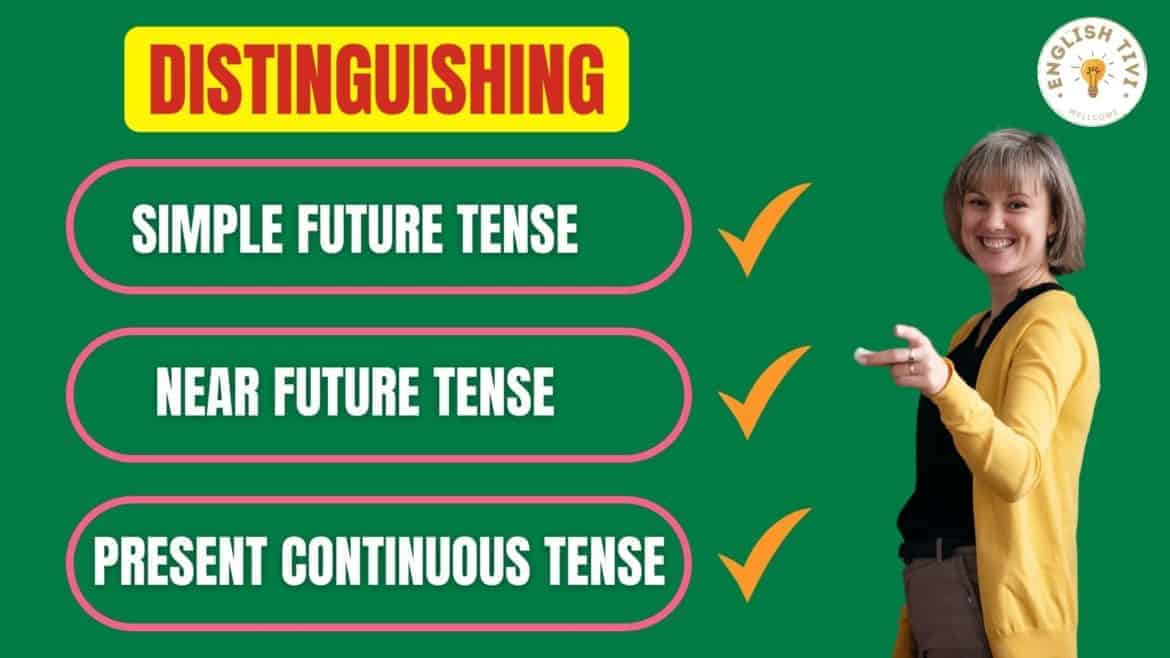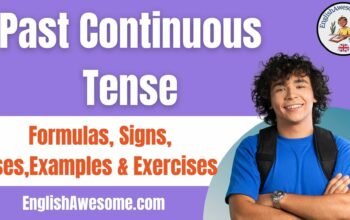The Future Simple & The Near Future are 2 English tenses that are used a lot in everyday life. Therefore, it is very important to distinguish and use these two tenses correctly.
⏩ Sign Up to Get Bonus

You might also like: ALL the English Grammar Basics You Need
Introduction
The simple future tense is used when there is no plan or decision to do anything before we speak. We make spontaneous decisions at the time of speaking. Usually, use the future simple with the verb to think before it.
The near future tense is used to express a specific plan or intention with a calculation in the not-too-distant future. Formula: S + is/ am/ are + going to + V.
Simple Future & Near Future Tense Formula:
| Simple Future Tense | Near Future Tense |
| 1. To be: S+ will/shall + be + Adj/noun Ex: She will probably become a good wife 2. Verb: S+will/shall+V-infinitive Ex: I will help you to do this exam. | 1. To be: S+be going to+be+adj/noun Ex: She is going to be an actress soon 2. Verb: S + be going to + V-infinitive Ex: I'm going to help my parents around the house. |
Usage
| Simple Future Tense | Near Future Tense (Be going to) |
| 1. Expressing a decision at the moment of speaking Ex: Hold on. I'll give her the phone. I will see if I can help you to solve this problem. 2. Expressing unfounded predictions Ex: Facebook will never die. 3. When we want to make promises, we use the Future Simple Ex: Ms. Anna, I promise I will meet all the deadlines. ** Signal Words: I think I don't think I am afraid, I am sure that I fear that Perhaps, probably | 1. Expressing a plan, intention that has been decided before the time of speaking Ex: I have receiced my salary. I am going to buy a new dress. Will you going to the ashram with me tomorrow? 2. Express a prediction based on present evidence Ex: The sky is very dark. It is going to rain. My aunty is going to have a baby. 3. Talk about a fixed plan in the future that has been planned to do but has not been specified Ex: We're going to get married next year. |
Near Future & Present Continuous
| Near Future Tense (Be going to) | Present Continuous Tense |
| 1. If the speaker wants to emphasize the intention of the action Ex: They are going to buy that car at the end of this year 2. Describe an action that will happen later in the future Ex: Today, I’m going to a coffee shop after work | 1. If the speaker wants to emphasize the action they will do Ex: They are buying a car at the end of this year. 2. Describe an action that will happen soon Ex: I’m going to picnic with my friends this weekend 3. Intentions/decisions/plans expressed in Present Continuous are more likely to come true Ex: She is applying for that position next month. |
Recognition
Simple Future
In the sentence there are adverbs of time in the future:
- In + time
- Tomorrow, next day
- Next week, next month, next year
There are opinion verbs in the sentence such as:
- Think, believe, support,…
Near Future
The sign to identify the near future tense includes adverbs of time in the future similar to the sign to identify the simple future tense. But there are additional grounds or specific examples.
- In + time
- Tomorrow, next day, next week/month/year
Example: Next week I am going to visit my parents in Tokyo
Present Continuous
There are adverbs of time in the sentence
- Now, right now
- At the moment, at present
- Look!, listen!, keep silent!
Example: Look! The bus is coming
Read more: English Grammar
Exercise
- Jennie………………….15 next Monday. ( be)
- Be careful! The motorbike (go) ………………….. so fast.
- Next summer, I ………………….to London. My brother lives there and he bought me a plane ticket for my birthday. (travel)
- Listen! Someone (cry) ………………….. in the next door
- My sister (sit) ………………….. next to the handsome boy over there at present?
- It’s hot in here, I think I …………………. on the fan. (turn)
- Now they (try) ………………….. to pass the subject
- Bye! I ………………….back! (be)
- He (not work) ………………….. in his bedroom now.
- They wear sneakers because they …………………. badminton.(play)
Answer
- will be
2. is going
3. am going to travel
4. is crying
5. is sitting
6. will turn
7. are trying
8. will be
9. is not working
10. are going to play
Subscribe to the English TV channel on Youtube to improve your English skills!





